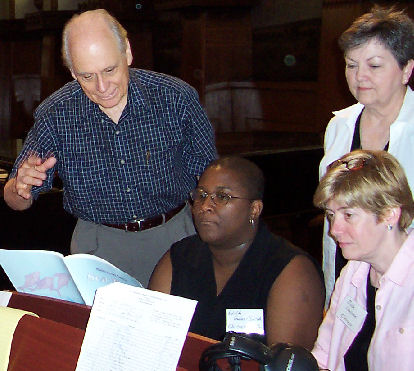Dr. Robert Pace Method of Keyboard Instruction
Who is
|
My Connection. My first contact with the Robert Pace approach came shortly after I began teaching in the Young Peoples Arts Program at Alverno College in Milwaukee, in 1976. Music for Moppets was a new program that reflected a growing feeling in the piano teaching world that young children could be taught music readiness through a kind of music kindergarten where they could do activities appropriate and fun for pre-schoolers that would prepare them for success and interest in further musical study. Previously the idea was that children needed to be old enough to read (in order to begin reading music) and of course to have the patience to sit still on a piano bench for a typical 1/2 hour lesson before they could begin to be tutored in piano. Exploring this new idea with cute little ones was great, but the real excitement came when I studied more extensively the Pace program and saw the cumulative benefits of the approach as the students became more advanced. I began to take training sessions from Consultants, and in the summer of 1979 left my husband Reno, with unpacked boxes from our recent move back to Chicago and headed for New York for the Summer Institute at Columbia University - Teachers College with Dr. Pace. Subsequent years teaching has given me the opportunity to explore how to best incorporate the approach into my personal instructional style, strengths and interests. Although each teacher brings his/her own personal interpretation to the approach, the main points that the Pace method have come to represent are: |
 |
|
|
at Roosevelt University in Chicago 2005 |
l) Teaching concepts about music. An example of a concept about melody is for instance, is that music can go up down or stay the same; a concept about rhythm is that music can have short and long sounds which combine in different ways to make rhythm patterns. Concepts are broad reaching ideas that can be applied to each new situation and expanded upon in complexity as a student's development unfolds. 2) Group learning. Working with several students together in a cooperative environment where students can learn from each other as well as from the teacher. 3) Creativity. Approaching the study of music as a creative process. 4) Analytical thinking. Teaching students to think of practice as problem solving, and teaching techniques of evaluative practice--that is, how to identify the problem, prescribe a solution, administer it swiftly, and analyze the results. 5) Comprehensive musicianship stresses developing all musical skills including; technique, reading , ear training, knowledge of music theory, and improvisational skills simul-taneously. All of this is intertwined within the repertoire or songs the students are learning. Consultants. IPTF Consultants are teachers who have trained extensively with Dr. Pace and who make themselves available to teach the approach to other teachers. We meet periodically as a group to work with Dr. Pace on new publications; review beginning basic concepts; and analyzed advanced repertoire from different musical periods. He stresses with consultants the importance of teaching students to play beautifully and musically through good technique. Dr. Pace encourages consultants to think of piano practice as problem solving. He always includes a commentary on the state of world affairs and an inspiring call to pursue personal growth on a daily basis, both musically, professionally and personally. If you know a music teacher or piano teacher you think might be interested in studying the Pace approach us, let us know. If you are interested in piano lessons using the Pace approach contact us. The Lake Shore Music Studio, Chicago, LSMSPiano's Home Page. |
| Pace Philosophy. Two points Dr. Pace pondered: one was why did conservatory students only begin learning music theory when they began intensive advanced learning--wasn't there a way to make this information available in earlier levels of study so that theoretical knowledge could evolve hand in hand with technical advancement? One doesn't get signed on to a major baseball league before one is taught rules, strategies, etc. of the game; she doesn't get the building contract for the Sears Tower before she is taught principles of architecture.
Why do students ... show so much interest in the lesson... after their own? He developed his first course books in the 1950s. In the 60s, Dr. Pace was asked by President John F. Kennedy to serve on a four member committee to make a study of music in the U.S. then in 1963 he became Director of the National Piano Foundation, where he served from 1963 to 1977. Dr. Pace resigned NPF to form the International Piano Teaching Foundation, (IPTF) in order to more specifically promote the learning theories he espoused. Although his particular method books are not used universally by piano teachers, whatever books they do use have most likely been influenced by his leadership in the field. In the 60's through the 90's many authors of the piano pedagogy materials have been students of Dr. Pace at Columbia. |
|
| Listen to a Podcast of Dr. Pace philosphy from 1982 conference. |
